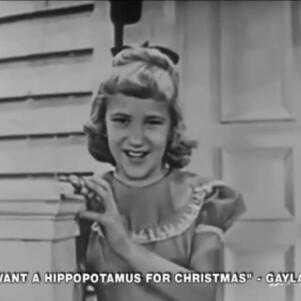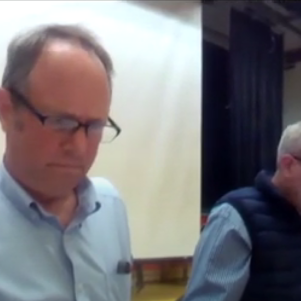‘Memory Cafe’ creates community for people with dementia
By Beth Treffeisen | December 1, 2015, 5:30 EST
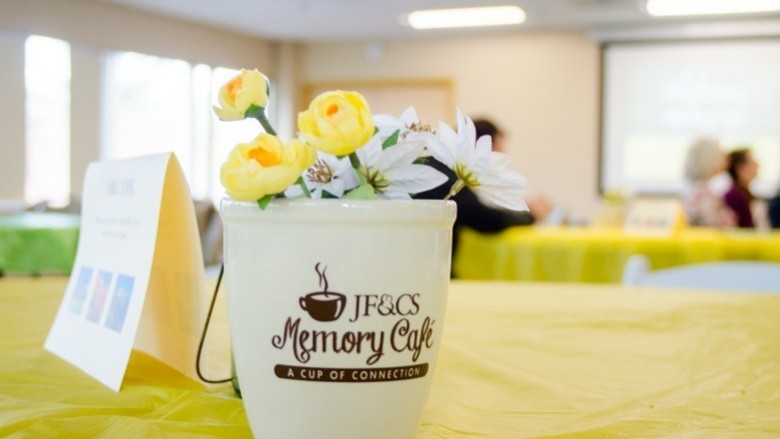
WALTHAM – The sunlit room buzzed with excitement when Gary Glazner and John McFadden, strumming a ukulele, bounced on stage in song. Participants applauded and sang in unison as each person in the room was introduced.
“That was a marathon” by the time it ended, said Glazner, the founding director of the Alzheimer’s Poetry Project in New York City’s Brooklyn borough.
On Nov. 13, the Jewish Family and Children’s Service in Waltham hosted a “Memory Café” for about 30 people suffering from dementia or Alzheimer’s disease along with their care partner. It was one of several similar events hosted by organizations in greater Boston. The goal was to help people connect over coffee and snacks.
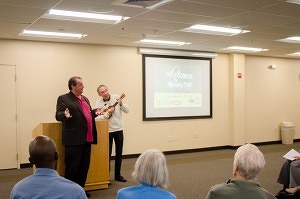
Gary Glazner and John McFadden introduce themselves by song. (Beth Treffeisen, NewBostonPost)
Smiles broke out on faces in the crowd as McFadden and Glazner engaged them in repeat after me songs, dance movements and poetry.
“This is incredible. Look at it! There is a need for dementia individuality where people feel included,” said Marjie Sokoll, the director of spirituality and aging for the service provider, which operates in 250 communities around the state. “He’s tapping into their strengths. Music, poetry, dance – that all stays.”
The program aims to help combat the effects of the disease, said McFadden, a coordinator for Fox Valley Memory Cafés in Wisconsin. “When you get dementia there is isolation and exclusion, and friends fall away.”
Memory cafés, he said, also create a place for care partner to share their experiences and create contacts within this underserved community to help improve the quality of life for people with dementia.
Susan McFadden, McFadden’s wife and co-coordinator for the Wisconsin program, said she believes that with lengthening life spans for Americans, there’s a growing need to support people with dementia. “We are going to have to get our communities to accept dementia as a disability and make those accommodations,” she said.
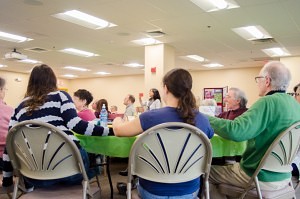
Seniors and Brandeis University volunteers hold hands during a reading of a poem. (Beth Treffeisen, NewBostonPost)
Melanie Gomes, a student volunteer from Brandeis University’s “Companions to Elders” program, is excited about the local program’s evolution.
“Just because you get older doesn’t mean your life ends,” said Gomes, a senior. “You can bring value to your life at any part. It doesn’t matter how old you are.”
For some adult children, helping their parents participate in the program provides a way to keep them active.
Darcy Morales-Zullo, whose father, Pedro A. Morales, was among the local participants, said she is thrilled about the opportunity the program offers.
“There is not a lot of value put on the elders and that’s not how I was brought up culturally,” said Morales-Zullo, who is also her father’s care partner. “I’m just the opposite, I honor the elders.”
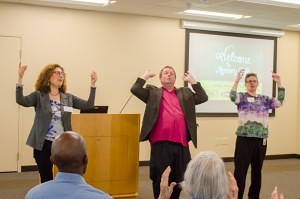
From left to right, Marjie Sokoll, Gary Glazner and Susan McFadden, help show the choreographed movements to a poem. (Beth Treffeisen, NewBostonPost)
Morales-Zullo said she believes it’s important to keep her 93-year-old father active and that she enjoys bringing him to community events. She said she feels that helping her father is the least she can do after he worked so hard to enable her mother to stay home to raise their children.
At the end of their performance, Glazner instructed the crowd in creating a group poem. The themes included Veteran’s Day, remembrance and kindness. When Glazner went around the room asking participants if they could talk to a loved one they remember, what would that person say? Morales-Zullo, with tears welling up, said her mother would reply with, “I’m still here with you.”


